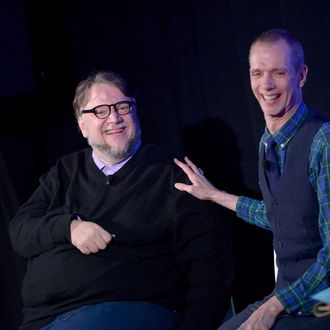
Guillermo del Toro has a not-so-closely guarded secret: His new fantasy film The Shape of Water is rife with coded commentary on the current political climate. “The movie is about today. It’s about everything that we’re dealing with today — the toxic division of the ideology of us and them,” Del Toro said during a panel with actor Doug Jones at Vulture Festival in Los Angeles.
The film, which opens in limited release December 1 and won the Golden Lion award at the Venice Film Festival, is a romantic fable set in 1962 at the dawn of the Cold War. In it, a mute janitor (Sally Hawkins) falls for a mysterious amphibious creature (played by Jones, del Toro’s go-to creature actor) being held and studied at a secretive government facility. The eerily alluring aquatic being, del Toro explained, “represents ‘the other.’ We’re living in a time where we demonize the Other. We are told we’ve got to fear. [We’re being told] everywhere, constantly, why we have to divide the world between ‘us’ and ‘them,’ whether race, religion, government sexual preference, gender — anything that creates this fake division between us and them, and there’s only us. There is only us.”
The Shape of Water hacks away at those prejudices. “The movie tries to embody the beauty of the Other,” the writer-director explained. “What makes us different is what makes us great. It’s sort of Beauty and the Beast in a way that shows you that Beauty doesn’t have to be the perfect princess, she doesn’t have to look like a perfume-commercial model … and the Beast doesn’t have to be transformed to be loved, and he doesn’t have to turn into a boring fucking prince and renounce the essence of who he is.” But this isn’t a fairy tale where the monster, the other, turns back into something that resembles the princess. “Because, to me, love is not transformation,” del Toro continued. “Love is acceptance and understanding.”
To that end, del Toro said he chose to set his film in Cold War–era America — a time that is often the subject of nostalgia, despite the fact that it was rife with racism, misogyny, and xenophobia — in order to speak to the present. “We are beyond words right now, we are beyond truth,” del Toro said of the current state of political discussion. “But if I tell you, ‘Once upon a time in 1962, in a country not far away, there was a woman …’ then the movie is a fairy tale for troubled times. And you lower your guard and you accept to discuss with me what makes us human, what makes us connect, without the guard for reality, with the authenticity of a fairy tale. Because fairy tales are not realistic, but they’re authentic.”

